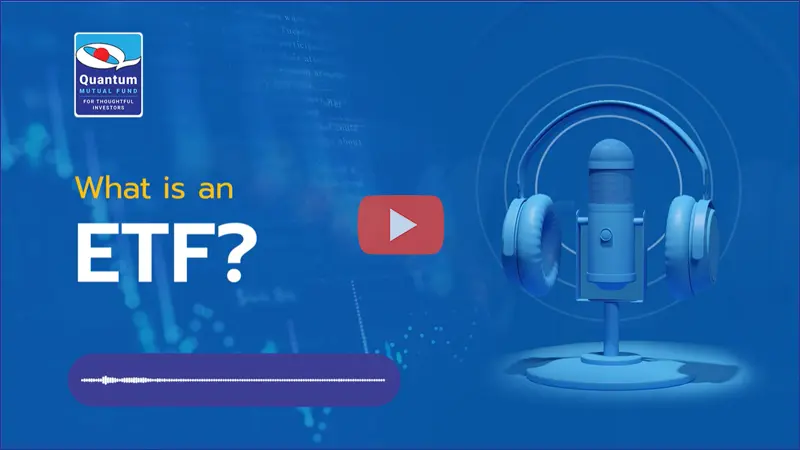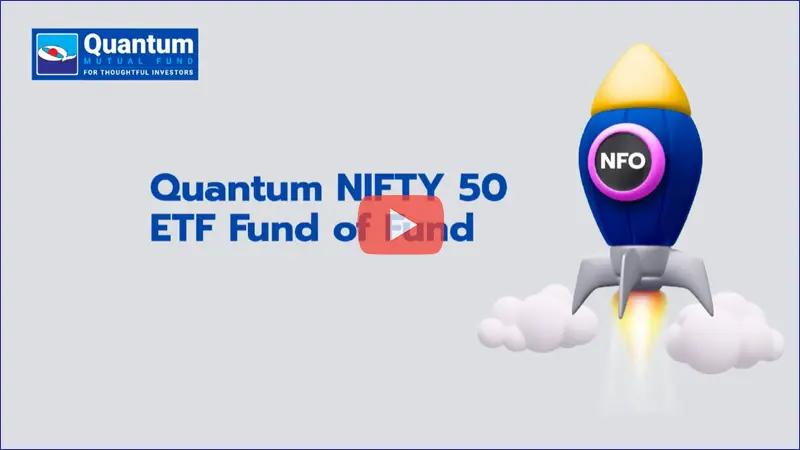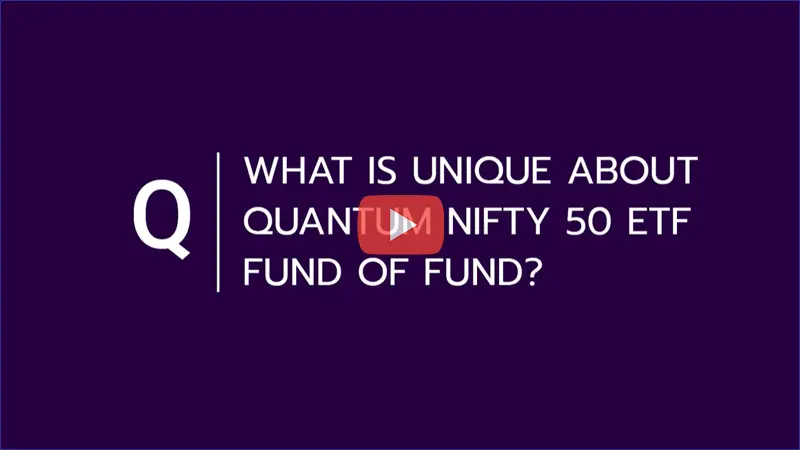An Exchange Traded Fund (ETF) offers investors an opportunity to match the performance similar to a particular index.
What are Exchange Traded Funds (ETFs)?
Exchange Traded Funds (ETFs) are passively managed mutual fund schemes that invest in a basket of securities such as equities or bonds. These funds aim to track and replicate the performance of a particular index such as Nifty 50, S&P BSE Sensex, etc. by mirroring their composition. Thus, when you invest in ETFs you can expect to earn returns in line with the benchmark index or market subject to tracking error.
ETFs are traded on exchanges -- just like stocks, where investors can buy and sell units during market hours. Unlike other mutual fund schemes where transactions take place at the day’s closing NAV, units of ETFs can be bought and sold at the NAV prevailing at the time of the transaction. Being passively managed, ETFs entail lower cost (expense ratio) compared to actively managed mutual fund schemes.
Types of Exchange Traded Funds (ETF)

Equity ETFs
Equity ETFs track equity indices such as the Nifty 50, Nifty Next 50, Nifty Midcap 150, etc...
Equity ETFs track equity indices such as the Nifty 50, Nifty Next 50, Nifty Midcap 150, etc. Equity ETFs also include schemes designed to replicate a particular sector such as Banking, Infotech, Pharma or a theme such as ESG, Consumption, Infrastructure, etc.

Debt ETFs
Debt ETFs invest predominantly in fixed-income instruments like government bonds...
Debt ETFs invest predominantly in fixed-income instruments like government bonds and corporate debentures of varying maturities and credit profiles. These schemes invest in the same proportion as the underlying index such as Nifty Bharat Bond Index, Nifty 5-year G-sec Index, Nifty CPSE Bond Plus SDL Index, etc.

Commodity ETFs
Commodity ETFs invest in respective commodities and track their domestic prices...
Commodity ETFs invest in respective commodities and track their domestic prices. For example, Gold ETFs and Silver ETFs are some of the Commodity ETFs that are popular in India that provide returns in line with the prices of these precious metals.

International ETFs
International ETFs invest in international stocks thereby offering diversification beyond the Indian market...
International ETFs invest in international stocks thereby offering diversification beyond the Indian market. They track indices such as 500, Nasdaq 100, NYSE FANG+, etc.
Best ETF Funds in QAMC
As the name suggests, ETFs can be bought and sold on the stock exchanges. ETFs are Exchange Traded Funds that follow an index such as NSE Nifty 50 or BSE Sensex. The objective of an ETF is to passively replicate or mirror the index in terms of its portfolio composition. Some of the latest ETFs are based on popular sectors such as BSE Auto, or FMCG, banking and healthcare. You can trade ETFs easily - they can be redeemed or sold anytime during market hours.

Quantum Nifty 50 ETF Fund
Quantum Nifty 50 ETF has a 15 year track record of passively replicating the portfolio and performance of the Nifty 50 Index. The ETF will help diversify your money across the top 50 companies of the index across different sectors through a single investment. It has a low tracking error and is a low cost and convenient way to invest.
Quantum Gold Fund ETF
Quantum Gold Fund ETF has a physical gold backing of 24Karat pure Gold, sourced from London Bullion Market Association accredited refiners. Each unit of Quantum Gold Fund ETF represents 1/100th of 1 gram of gold offering a low cost and convenient way to invest in Gold.
Quantum Nifty 50 ETF Fund of Fund
The Quantum Nifty 50 ETF Fund of Fund is a first of its kind wrapper fund that invests in units of the Quantum Nifty 50 ETF, offering the efficiency of an ETF with the convenience of an Index Fund.
How to Invest in Exchange Traded Funds (ETF)?
Since ETFs are traded on stock exchanges (just as stocks), you need a trading and demat account to transact. Once you open a demat account you can begin investing in the units of ETF by selecting the ETF of your choice listed on exchanges and by transferring the investment amount.
The prices of all types of ETFs fluctuate throughout the trading session as per the demand. The units can be purchased and sold at the prevailing real-time NAV. The closing NAV of ETF is disclosed at the end of the day.
The Advantage of Investing in Exchange Traded Funds
Diversification
ETFs allow investors to create a diversified portfolio of passive schemes comprising different asset classes, market segments, and geographies.
Liquidity
Units of ETFs can be bought and sold on exchanges throughout the trading hours at real-time prices.
Transparency
Since ETFs track a specific index, there is transparency about the securities owned by the scheme. Furthermore, just like other mutual fund schemes, ETFs are also required to disclose the closing NAV.
Low-cost investment
ETFs being passive funds entail a lower expense ratio compared to actively managed mutual fund schemes as they are passively managed.
Eliminates unsystematic risk
Since ETFs follow a passive investment strategy, i.e. simply follow the underlying benchmark index, the risk of the fund manager’s invesing wrong, gets eliminated.
To Invest Money in ETF You Broadly Have Two Types

Equity-Oriented ETFs
The capital gains on redemption of equity-oriented ETFs are taxed at the rate of 15%...
The capital gains on redemption of equity-oriented ETFs are taxed at the rate of 15% if the holding period is less than one year. For units redeemed after one year, capital gains are taxed at 10% if the gains exceed Rs 1 lakh in a financial year.
How to Choose the Right Exchange Traded Fund?
Consider the following factors to pick the best ETF:

Cost
When deciding between two similar ETFs, prefer the one with a lower expense ratio as it can make a significant difference to the overall portfolio returns in the long run.
 2.webp)
Tracking error
The Tracking error is the deviation of an ETF's returns from its underlying index. Prefer ETFs that have low tracking error compared to similar schemes in the category which will ensure that the performance of the fund does not deviate much from the underlying index.
Who Should Invest in Exchange Traded Funds?
ETFs are suitable for investors looking to build a low-cost mutual fund portfolio by mirroring the performance of a specific index. It is a convenient way of passive investing for those who find it challenging to select the right mutual fund schemes from a plethora of actively managed funds available in the market.
Know more about Exchange Traded Funds (ETF)
-
ETF VideosWhat is Exchange Traded Fund (ETF)?
Gain insights on the features, benefits, and risks associated with ETFs, and how they differ from other investment options such as mutual funds and stocks.
-
Quantum Nifty 50 ETF Fund of Fund – A Convenient Way to Make Passive Investment
Learn more about Quantum’s market differentiated offering - Quantum Nifty 50 ETF Fund of Fund with a proven track record of 14 years and counting.
-
Quantum Nifty 50 ETF FOF – A Rockstar Fund offering a convenient way to make passive investment
Know What is unique about Quantum Nifty ETF 50 Fund of Fund – A fund that combines Convenience of Mutual Fund plus Efficiency of an ETF.
Product Labelling
| Name of the Scheme | This product is suitable for Investors who are seeking* | Risk-o-meter of Scheme |
|---|---|---|
|
Quantum Nifty 50 ETF An Open Ended Scheme Replicating / Tracking Nifty 50 Index. |
• Long term capital appreciation • Investments in equity and equity related securities of companies in Nifty 50 Index |
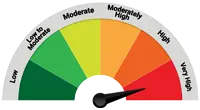
Investors understand that their principal will be at Very High Risk. |
|
Quantum Gold Fund An Open Ended Scheme Replicating / Tracking Gold. |
• Long term returns • Investments in physical gold |
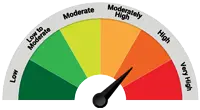
Investors understand that their principal will be at High Risk. |
|
Quantum Nifty 50 ETF Fund of Fund An Open-ended fund of fund investing in units of Quantum Nifty 50 ETF. |
• Long term capital appreciation • Investments in units of Quantum Nifty 50 ETF – Exchange Traded Fund |

Investors understand that their principal will be at Very High Risk. |
*Investors should consult their financial advisers if in doubt about whether the product is suitable for them.
Disclaimer: The views expressed here in this Article / Video are for general information and reading purpose only and do not constitute any guidelines and recommendations on any course of action to be followed by the reader. Quantum AMC / Quantum Mutual Fund is not guaranteeing / offering / communicating any indicative yield on investments made in the scheme(s). The views are not meant to serve as a professional guide / investment advice / intended to be an offer or solicitation for the purchase or sale of any financial product or instrument or mutual fund units for the reader. The Article / Video has been prepared on the basis of publicly available information, internally developed data and other sources believed to be reliable. Whilst no action has been solicited based upon the information provided herein, due care has been taken to ensure that the facts are accurate and views given are fair and reasonable as on date. Readers of the Article / Video should rely on information/data arising out of their own investigations and advised to seek independent professional advice and arrive at an informed decision before making any investments. None of the Quantum Advisors, Quantum AMC, Quantum Trustee or Quantum Mutual Fund, their Affiliates or Representative shall be liable for any direct, indirect, special, incidental, consequential, punitive or exemplary losses or damages including lost profits arising in any way on account of any action taken basis the data / information / views provided in the Article / video.
Mutual fund investments are subject to market risks read all scheme related documents carefully.
Frequently Asked Questions on Exchange Traded Funds (ETF)
No, investment in ETFs without active trading and Demat Account is not possible. If you do not have a Demat account you can consider other similar passive investment options such as Index Funds and Fund of Funds.
Since ETFs invest in various securities such as equity, bond, and commodity they are prone to market volatility. So, they cannot be construed as safe.
Depending on the type of scheme you invest in, an ETF may be prone to various risks such as market risk, liquidity risk, currency risk, sector/commodity specific risk along with the chances of high tracking error.
You can earn money (returns) from a combination of dividends paid by the stocks (if you own an equity-oriented ETF) and capital gains, i.e., a rise in the price of the securities owned by the ETF.
Equity ETF, International ETF, and Gold ETF mutual funds are suitable for long-term goals with a high-risk appetite. On the other hand, a Debt ETF is suitable for low-to-moderate to high risk appetite investors with a short-term to medium-term investment horizon.
ETFs do not carry any entry or exit load. However, it is advisable to read scheme-related documents carefully to get information regarding any applicable loads/charges.
What is the difference between Exchange Traded Funds and actively managed mutual funds?
| Point of difference | Active Mutual Funds | Exchange Traded Funds (ETFs) |
|---|---|---|
| Transaction | Mutual Funds can be purchased / redeemed at NAV based price. | ETFs are traded during the course of the trading hours and can be bought and sold at different price points. |
| Portfolio Management | Active Mutual Funds are actively managed depending on the market conditions and outlook. | ETFs are passively managed. |
| Expense ratio | In the case of Mutual Funds, the fund manager actively takes investment decisions on behalf of the investors. As a result, the expense ratio is higher. | Being passively managed, ETFs have a lower expense ratio. |
| Flexibility | Mutual fund units can be bought or sold only by placing a request with the fund house or a mutual fund distributor. | ETFs are freely traded on the exchanges and can be bought and sold at the investor’s convenience if they have a Trading & Demat account. |
| Liquidity | Mutual Funds can be liquidated on a T+2 basis (except ELSS which has a lock-in period of 3 years). | ETFs can be liquidated on a real-time basis subject to the liquidity in the respective ETF. |
Index Funds can be bought directly through an AMC or mutual fund distributor but to buy an ETF investors need to have a trading & Demat account.
All transactions of Index Funds are carried out at the closing NAV whereas ETFs can be purchased and sold at the prevailing real-time NAV.
Generally, the expense ratio of an index fund is slightly higher than that of an ETF, though it is lower than actively managed funds. However, it is important to determine the total cost of ownership when you invest in ETFs, which can include additional expenses such as annual charges for trading account, brokerage on transactions, etc.
In the case of Index Funds, it is the responsibility of the mutual fund house to allocate units for purchase transactions and to honour redemption requests. For ETFs, demand is an important factor that determines the liquidity.


